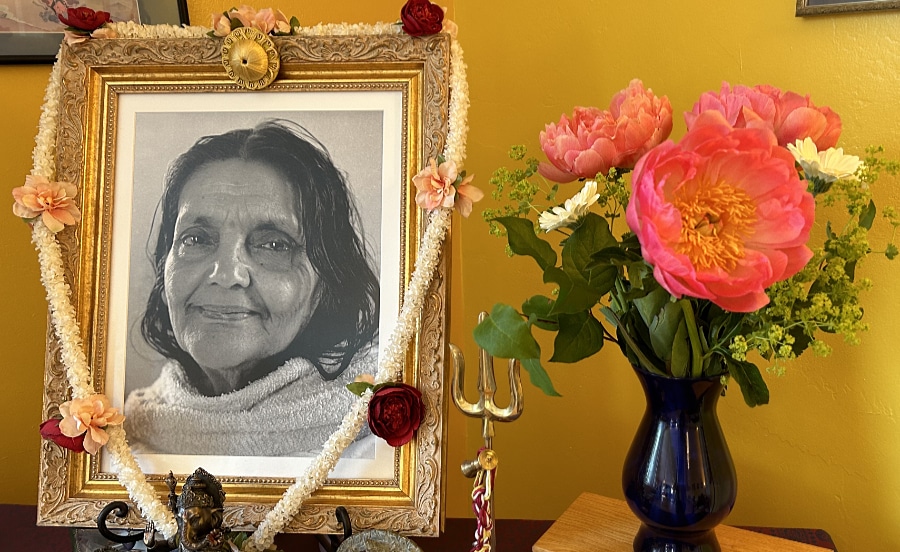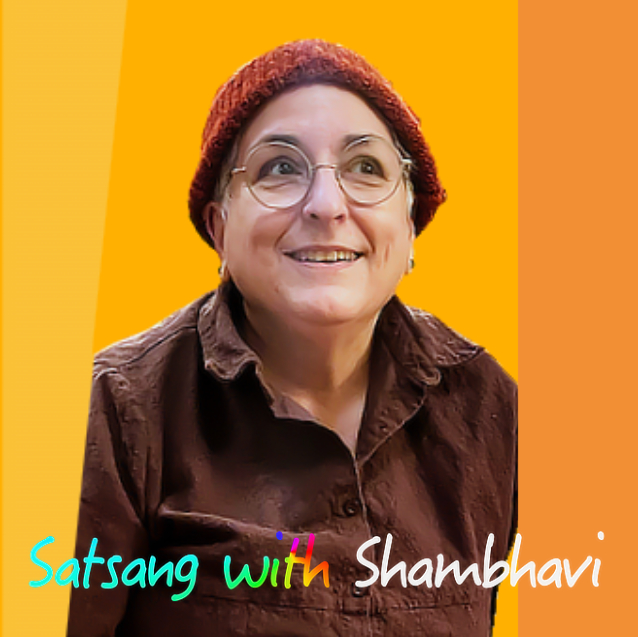Shambhavi and the Jaya Kula community gather for satsang and get real about all the questions we humans want answered. Intimate, courageous, heartfelt spiritual talk about pretty much everything. So happy you are here! A podcast from Satsang with Shambhavi
STUDENT 1
Can you talk about the relaxing while being sick? I can't seem to relax at all.
SHAMBHAVI
I've noticed that there really is a very blurry line between what we call being physically sick and being mentally off-balance. I find that there's this very odd experience, especially when you have a fever from a virus of some sort, of feeling somewhat mentally weird.
There's an aspect of relaxation which isn't about not feeling the thing that we're feeling. It's about being relaxed about what we're feeling.
For instance, if I have some flu, which is probably the sickest I've ever been, is when I've had actual flu, like the most intense concentrated sickness. And there you are, groaning in pain and vomiting.
And you have a super high fever and your head is swirling, and you just feel like every minute is torture. This is my experience of having actual flu. I actually had SARS virus the last time it came around. Oh, my God. It was so bad.
But in any case, that's happening. You can't do anything about it. You can't like go, I'm going to relax, and then I will feel perfectly fine. [laughter] The thing is still in you. You're not going to feel perfectly fine.
So the relaxation is around that. The relaxation around just feeling horrible. Like to just stop fighting it and just try to relax and recognize it's just completely natural that these things happen.
And the same goes with when we have difficult periods in our life, or difficult moments in our day. Or we break a bone, or we lose a job or a friend gets angry with us. It's like relaxing around how we feel about it and how we react to it.
And it's very subtle because it doesn't mean just, okay, fine, I'm just going to be a reactive jerk in response to whatever's happening. And I'm going to go, it's not fair. Reality is out to get me. I'm victimized.
It doesn't mean doing that. It means just recognizing that you have these patterns or that you have an illness and yielding to that. Just yielding to it and not fighting it as if there was something wrong.
The fact that you feel terrible when you're sick is not a problem. [laughs] It's completely natural to feel terrible when you're sick. So how can you stop struggling with everything?
There's an aspect of relaxation, which is to stop struggling with everything. There's concepts that are fueling this struggle. I shouldn't feel this way. I shouldn't be this way.
I should be further along. I should be more compassionate. Or I should be this, or I should be that. These are all these concepts, and then we struggle with ourselves because we feel we're failing.
Basically, it's all just this internal thing where we have these concepts and now we're struggling. And we feel we're failing. And it's all just happening inside of us. It's all part of our karma. It's not actually fixing anything.
So the idea is, something happens that's upsetting, it's okay to be upset. Or if you have a virus, it's okay to be sick. But to then feel this shouldn't be happening or there's something wrong with me and there's something unusual about this.
People often feel when things go wrong in their lives that there's something unusual about it. This shouldn't be. I shouldn't be experiencing this. Or this is terrible, railing against God.
Everything that happens is completely normal. Everything is normal. Everything. Everything that's happened has been experienced by so many people before.
So the idea is how can we just relax and get in touch with that feeling of sweetness of God, even while we feel like shit? We can hold both of these things.
STUDENT 1
That's the part I'm struggling with.
SHAMBHAVI
Stop struggling. [laughs]
STUDENT 1
I don't know how to stop.
SHAMBHAVI
I know. It's true. We're all such champion strugglers, and we don't know how to stop. It's absolutely true. But everything is fine. Everything that's happening is fine.
And if we can contact love in the middle of anger, and Ma in the middle of stomach flu. And our feeling of devotion in the middle of being angry or upset about something or feeling a loss, this is what we should be trying to do.
Not struggling with the bad feelings, but just going to the source and trying to reconnect to that. You can be upset and be fine at the same time.
STUDENT 2
It's really helpful to hear you talk about this. But also, I sometimes feel like other people in their attempt to comfort me are saying to me that they're uncomfortable with the way that I'm showing up.
SHAMBHAVI
People do that. Absolutely. If you tell someone you're upset about something, they'll try to make you feel not upset. [laughs] It's like instead of reminding you that you're loved, they'll just try to make sure you feel not upset.
Or they'll feel the sense of recoil if people are in a certain condition. Because they don't want to face the whole range of humanness. They don't want to be reminded of their own frailty and their own susceptibility and their own impermanence.
It's just like not wanting to be around dying people, not wanting to be around people who are in too much distress. Not wanting to be around people who are too angry or whatever they are. Not being able to host those feelings.
So you have two choices: you can try to talk somebody out of feeling what they're feeling, or you can leave, right? I had a friend once. I was going through a very rough period many years ago, and I was really in a lot of pain.
And a lot of things in my life just kind of changed dramatically all at the same time. And I was having a hard time handling it. And she said something really, really hurtful to me. She said that you're like an injured animal who nobody wants to be around.
So that's a horrible thing to say to somebody, and I just stopped being friends with her. Because who needs friends like that? But that happens when you're going along in a friendship and then it gets tested and then you find out.
Because everybody goes through times when they're just in a tremendous amount of pain. Everybody. And what do your friends do when you're in that condition? Or what do you do when your friends are in that condition?
You learn a lot about yourself. And you learn a lot about other people. So yeah, people do that. And then you have to decide, well, do I really want to continue being friends with somebody who recoils because of me feeling badly?
STUDENT 3
So I have situations like that where they have said tremendously painful things to me. And I just decided I don't want to be involved with them anymore. But I'm getting a lot of pushback from other people in my family. That's fine, right?
SHAMBHAVI
That's fine. First of all, I'll say that everybody's different and everyone's circumstances unique. So what I'm about to say doesn't apply to everybody.
You should never take anything I say as a paradigm because you always have to interact with your situation as it is in its uniqueness. We're kind of trained, all of us, but particularly women, to overlook massive amounts of mistreatment.
And when women particularly just say, no, I'm tired of this, when you have a response to it that is healthy, often you get told that your response is pathological. The opposite of what it actually is.
Family members are so used to the girls in the family taking up a lot of emotional slack and putting up with a lot of stuff. And that's our job. In a lot of families, that's our job.
I'm older than you, but we're roughly in the same generation. And it's probably still that way for a lot of women. But we're just not supposed to notice that we're being mistreated. [laughs]
I've noticed that even with some students, they have a lot of privilege. And when the abusive way that they treat other people is actually called out, named, and responded to, they're just affronted that anyone would dare to have a reaction to what they're doing.
So we get called pathological for the healthy things we are doing to stop being mistreated. It's a very complex thing, but yes, I applaud you. Why should we stick around for that?
We're trained to stick around for it, but we don't have to stick around for it. Especially when there's no opening. A lot of times there's some mistreatment going on, but there's also other things going on that are more loving.
So we might decide to work with that situation. But if there's really nothing there but mistreatment, why would anyone healthy stay with that? It doesn't make any sense, except for cultural conditioning.
So yes, it's perfectly fine. And it's also perfectly fine to change your mind if you want to. Everything that you do that is in recognition of your own value as a human being is fine.
STUDENT 4
Lately, I've been feeling a lot of tenderness towards my Catholic ancestry, and that's really new. I was just reflecting on some of Jesus's teachings, and I really just felt connected to "love thy neighbor."
And I just wanted to know if you could riff on that? Or if Ma said anything about neighbors? I know that she often would do things with her Muslim neighbors.
SHAMBHAVI
There's a lot of teachings from Ma about that. I think it was one of her main themes. But I remember going through this, too. Not going through it, but entering into this feeling of just appreciation for any form of devotion that anyone was embodying.
No matter what tradition it was. I've always had a soft spot for Catholicism because I grew up in a Catholic neighborhood and went to church with my best friend.
That feeling of appreciation for devotion and worship, which opens up as our own appreciation for it opens up. It's wonderful, right? Ma said that all spiritual traditions come from the same source.
And they're all expressions of the generosity of this alive, aware reality. Giving different kinds of beings the paths that they need to recognize who they are and what's happening in experience of devotion.
It wasn't just that she did Namaz with her Muslim neighbors. It's that she would have participated and appreciated in any spiritual tradition and entered into that devotional path with anybody who was wanting her to participate.
In terms of neighbors, we can start in a smaller frame of reference. Most people love people in their family. Most people have at least a few friends.
Then maybe we learn to love people in other communities. Whether it's spiritual community or some other elective community. Maybe we have a humanitarian feeling of love for more people than that.
But ultimately, all of those kulas, all of those families of neighbors, people we are next to, are all just smaller stages for that feeling of devotion and compassion for everything and everyone. Not just for sentient beings.
But for everything as being an aspect of the livingness of God. Ultimately, when we're really in contact with that wisdom of the heart in a fuller way, we just feel a sense of wonder and devotion toward everything.
And everything becomes a neighbor, everything is a kin. This is Ma's teaching. But it's also just something that we come upon naturally. It's inevitable.
Now you're having this experience, and this will open up. As you keep practicing, this will open up until there is no sense of special neighbors anymore or even special things. You could look at a rock and feel a sense of devotion and tenderness.
And Ma said that in terms of all traditions being roads built by the same compassion itself, that obviously not all traditions have the same view. And some traditions teach things that we might consider to be rather heinous.
Or at least they embody their traditions in a somewhat heinous way. But even that, Ma said, even those traditions, if someone in those kinds of traditions is really devoted, they can complete those paths.
And that a path with a larger view will open up and out for that person. So even, you get to the point where you don't feel alarmed or as alarmed by some of the ways that people are participating in religion.
Recognizing that there's something there that is of value to the people in those traditions. Everyone is somehow working out their limitations.
What happens, for instance, when someone is in a tradition where the teacher is abusive? I mean, there's many traditions where there are abusive teachers. So many responses can happen to that, right?
One possible response is that you get really disenchanted and you leave spiritual practice for some time. But when you come back to it, you're coming back on your own terms.
You're coming back having much more of a sense of why you're there. Maybe you got into that situation with someone who was abusive because you were magnetized by something about them. Or something that was happening based on your karma.
But then you get out of it and it's very traumatic. But somehow through that trauma, you have more clarity. And you get more of a sense of it. Your practice being your own, your path being your own. And not giving over to being magnetized by somebody who isn't worth your attention.
So it's just like the process that we're all in. Some people we used to be friends with or some things we used to believe or some things we used to do no longer seem appealing to us when they were once very appealing.
Why do they no longer seem appealing? I mean, this is not just a process that happens in religious life. This happens all throughout life in every sector of life.
And things that were appealing no longer seem appealing by and large because we've gotten more clarity and more wisdom. And now we're choosing something that embodies a bigger view. More compassion.
So not only do we come to feel moved by certain people's expressions of devotion in certain traditions, but we even could feel moved by the expression of devotion of someone to a really terrible teacher or a really terrible tradition.
Just recognizing that their devotion is sincere. You can have sincere devotion in those circumstances. There's no sense anymore that we have to reject something out of hand or consider to be all-bad or go on ranting and raving about it.
There's also, myself having been in a spiritual community where the teacher was abusive. There was no sense either of denouncing that person publicly.
For me because of recognizing that there were people who were just working out whatever they needed to work out there. And maybe were getting some benefit from it.
That doesn't mean that we would never denounce a horrible teacher. But still, there's a sense that there might be something of value even when things aren't perfect.
Sign up to receive email updates
Enter your name and email address below and I'll send you periodic updates about the podcast.


